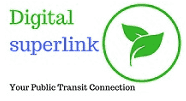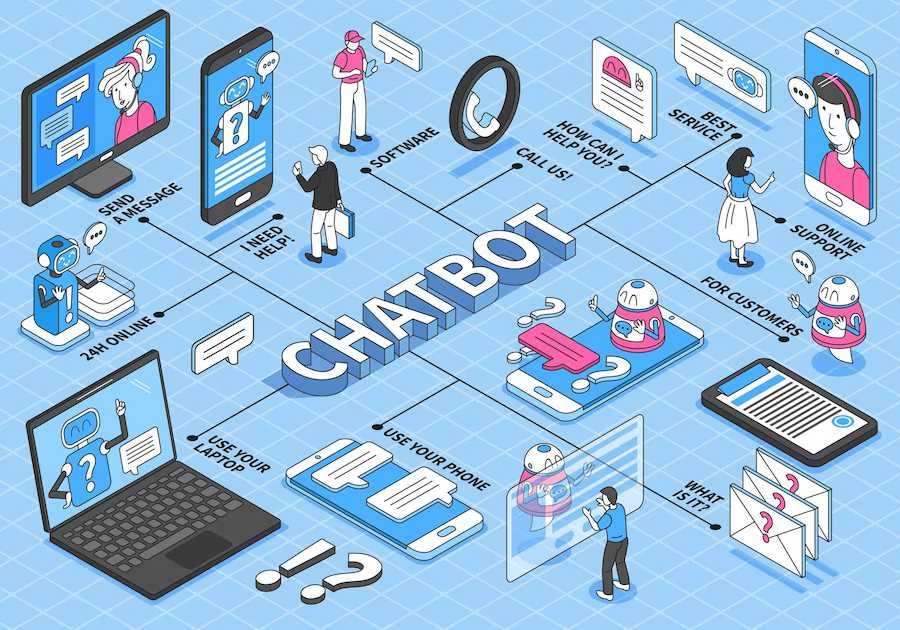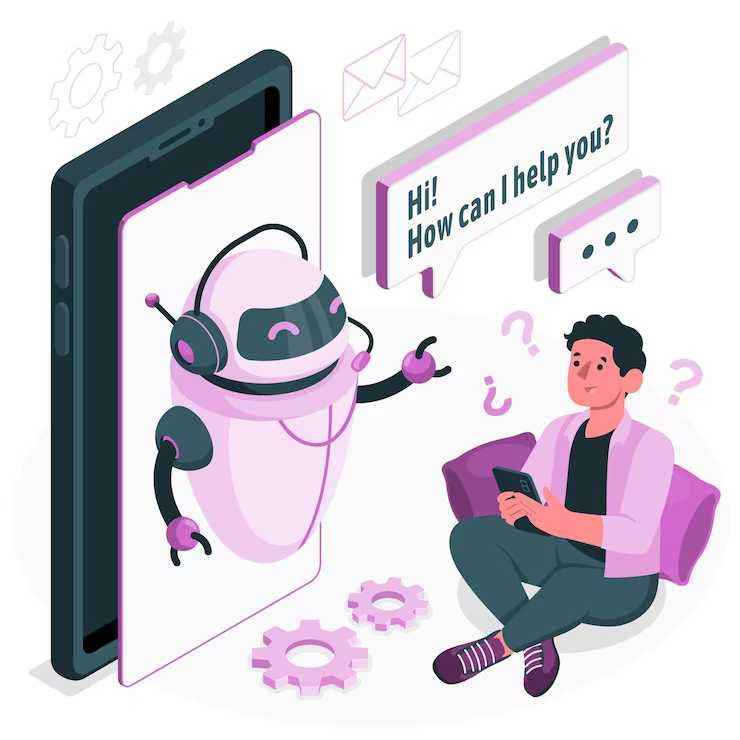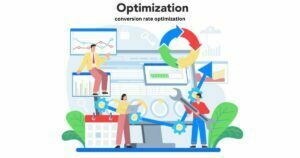In today’s fast-paced digital landscape, businesses are constantly seeking innovative ways to engage with their customers and enhance their marketing strategies. One such groundbreaking solution that has revolutionized the way brands interact with their audience is chatbot marketing. In this article, we delve into the realm of chatbot marketing, exploring its benefits, implementation strategies, and how it can propel your business to new heights.
Businesses are always looking for new, creative methods to interact with their clients and drive expansion. Chatbot marketing is one such tool that has grown significantly in popularity. (AI chatbot marketing) Artificial intelligence-driven chatbots have transformed customer interactions, resulting in better customer service, more leads being generated, improved user experiences, cost and time savings, data collecting and analysis, higher sales and revenue, and competitive advantage. In this post, we’ll examine the seven outstanding advantages of chatbot marketing and show how they might promote fast company growth.
#Understanding Chatbot Marketing
Chatbot marketing, a fusion of artificial intelligence and conversational technology, offers businesses an unparalleled opportunity to deliver personalized, real-time interactions with their customers. By leveraging chatbots, brands can automate customer support, lead generation, and sales processes, ensuring round-the-clock availability and seamless communication.
#What is a chatbot?
A chatbot is a computer program that uses natural language processing to replicate human conversations. It communicates with users via text or voice channels, providing quick and accurate responses.
“Experience the Ultimate AI Chatbot Services – Join Now and Get Yours for FREE!”
#How do chatbots work?
Machine learning algorithms are used in the development of chatbots to provide them with the ability to comprehend and analyze user inquiries. By analyzing the input and producing pertinent responses in accordance with pre-set rules or by utilizing artificial intelligence and natural language processing, they respond to queries.
#Importance of chatbot marketing
Chatbot marketing has become vital for businesses due to its ability to automate customer interactions, provide personalized experiences, and gather valuable customer insights. It offers a range of benefits that contribute to explosive business growth.
#Benefits of Chatbot Marketing & Advantages of Chatbot
- Enhanced Customer Engagement: Chatbots provide an interactive platform for customers to engage with brands, resulting in a personalized and immersive experience.
- 24/7 Availability: With chatbots, businesses can cater to customer inquiries and support requests at any time, ensuring a prompt and efficient response.
- Streamlined Lead Generation: By utilizing chatbots, businesses can capture valuable customer data and qualify leads, enabling targeted marketing campaigns and improved conversion rates.
- Efficient Customer Support: Chatbots can swiftly address common queries and concerns, reducing the workload on support teams and improving overall customer satisfaction.
- Cost Savings: Automated chatbot interactions reduce the need for human intervention, resulting in significant cost savings over time.
- Data Collection and Analysis:
a) Gathering Customer Insights- Chatbots collect valuable customer data during interactions, including preferences, buying patterns, and pain points. This data can be analyzed to gain actionable insights and make informed business decisions.
b) Improved Decision-Making- By leveraging the collected data, businesses can identify trends, patterns, and customer preferences. This enables them to optimize their marketing strategies, enhance product offerings, and make data-driven decisions for business growth.
- 7. Increased Sales and Revenue
a) Personalized Product Recommendations
Chatbots can analyze customer preferences and purchase history to offer personalized product recommendations. This level of personalization increases the likelihood of upselling and cross-selling, leading to higher sales and revenue.
b) Upselling and Cross-selling Opportunities
By engaging customers in interactive conversations, chatbots can identify opportunities to upsell or cross-sell related products or services. This strategic approach drives additional revenue and maximizes customer lifetime value.
#Implementing Chatbot Marketing Strategies
To effectively implement chatbot marketing strategies, businesses must consider the following key steps:
1. Define Objectives and Use Cases
Identify the specific objectives you aim to achieve through chatbot marketing. Whether it’s providing instant support, generating leads, or driving sales, a clear understanding of your use cases will shape the development and deployment of your chatbot.
2. Choose the Right Platform
Select a chatbot platform that aligns with your business requirements and budget. Several platforms offer a range of features, including natural language processing, machine learning, and integrations with popular messaging apps and websites.
3. Design Conversational Flows
Craft intuitive conversational flows that guide users through meaningful interactions. Consider potential user queries and design responses that address their needs effectively. Incorporate personalized touches to create a seamless user experience.
4. Seamlessly Integrate with Existing Systems
Integrate your chatbot with existing systems, such as customer relationship management (CRM) tools, marketing automation software, or e-commerce platforms. This integration facilitates efficient lead nurturing, data management, and seamless user experiences.
5. Continuously Optimize and Improve
Regularly analyze chatbot performance and user feedback to identify areas for improvement. Refine conversational flows, optimize response accuracy, and stay updated with emerging trends and customer expectations.
Realizing the Potential: Successful Chatbot Marketing Examples
To truly Grasp the power of Chatbot Marketing, let’s explore a couple of real-world examples that have garnered remarkable success:
Example 1: E-Commerce Personalization
Company XYZ, a leading e-commerce brand, implemented a chatbot to personalize the shopping experience for its customers. By leveraging past purchase history and preferences, the chatbot recommended relevant products, provided real-time support, and streamlined the checkout process. This resulted in increased Customer satisfaction, Improved conversion rates, and higher average order values.
Example 2: Customer Support Automation
Business ABC, a software-as-a-service (SaaS) provider, integrated a chatbot into its website to automate customer support inquiries. The chatbot efficiently handled common questions, resolved issues, and seamlessly escalated complex queries to human agents when necessary. This approach reduced response times, freed up support resources, and ensured a consistent and reliable customer support experience.
Example 3: Personal Finance Chatbots
AI-powered chatbots are transforming the way individuals manage their finances. These virtual assistants help users track expenses, set budgets, and provide financial advice. With their ability to analyze financial data and offer personalized recommendations, chatbots empower users to make informed decisions and achieve their financial goals.
Example 4: Travel and Hospitality Chatbots
In the travel industry, AI chatbots are enhancing customer experiences by providing real-time information, assisting with bookings, and offering personalized travel recommendations. These chatbots can provide details about flights, hotels, and attractions, and even offer local tips, ensuring travelers have a seamless and enjoyable trip.
Example 5: HR and Recruitment Chatbots
Chatbots are revolutionizing the hiring process by automating tasks such as screening resumes, scheduling interviews, and answering candidate inquiries. HR chatbots can also provide information about company policies, benefits, and career opportunities, enhancing the overall recruitment experience for both employers and candidates.
#The Future of Chatbot Marketing
As we gaze into the future, the potential of chatbot marketing appears boundless. Advancements in natural language processing, machine learning, and voice recognition are poised to enhance chatbot capabilities further. Moreover, the integration of chatbots with emerging technologies like augmented reality and virtual reality will create immersive, interactive experiences for customers.
Conclusion
In an era where personalized experiences and instant gratification are paramount, chatbot marketing emerges as a game-changer. By leveraging the power of conversational technology, businesses can unlock new avenues of customer engagement, streamline support processes, and achieve unprecedented growth. Embrace the potential of chatbot marketing, adapt to evolving trends, and position your brand at the forefront of the digital revolution.
FAQs
Q1: How can chatbot marketing benefit small businesses?
A. Chatbot marketing benefits small businesses by automating customer interactions, reducing costs, and providing personalized experiences that foster customer loyalty.
Q2: Are chatbots suitable for all industries?
A. Yes, chatbots can be beneficial for businesses across various industries, including e-commerce, healthcare, finance, and customer service sectors.
Q3: Can chatbots replace human customer service representatives?
A. While chatbots can handle many customer queries, human customer service representatives still play a crucial role in handling complex issues and providing personalized support.
Q4: How do I get started with chatbot marketing?
A. To get started with chatbot marketing, businesses can explore chatbot platforms, define their goals, design conversational flows, and integrate chatbots into their websites or messaging platforms.
Q5: What are the potential drawbacks of chatbot marketing?
A. Some potential drawbacks of chatbot marketing include the need for proper training and monitoring to ensure accurate responses, potential privacy concerns, and limitations in understanding complex or nuanced queries.
Also, Read- 10 Reasons Why Your Business Needs HubSpot Marketing Automation Tools






